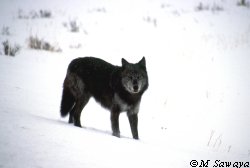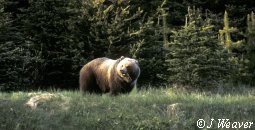
The wolf, lynx, marten, wolverine and grizzly bear, all carnivores that are vital members of our ecosystems, have been vanquished from most parts of North America by human activity.
The Rocky Mountains from Yellowstone to the Yukon offer one of the last, best opportunities on the continent for the conservation of carnivores.
In the heart of the Rocky Mountains, the North Fork of the Flathead River headwaters in southeast British Columbia west of the Continental Divide and flows across the international border into Montana where it forms the western boundary of Glacier National Park.

The carnivores that live in this region (wolf, lynx, marten and wolverine) and their key prey species (moose, elk and white-tailed deer) all move across the international border between Canada and the United States making the Flathead River basin truly a transboundary landscape that must be managed as one integral, ecological unit.
A unique community of carnivore species resides in the transboundary Flathead region that appears unmatched in North America for its variety, completeness, use of valley bottomlands, and density of species that are rare elsewhere.
Due to its unique characteristics and its strategic position as a linkage between National Parks in Canada & the US, the transboundary Flathead may be the single most important basin for carnivores in the Rocky Mountains. The challenge is to develop and implement a transboundary conservation plan that honours these outstanding values.
Key principles for carnivore conservation must include:
- maintaining of food resources with management of habit and prey populations provide security from excessive mortality with networks of core reserves and other precautionary measures
- maintaining regional connectivity with landscape linkages.
- It is in this context of biological vulnerability, vanishing spaces, and beckoning opportunity that the transboundary Flathead assumes critical importance for carnivores as a crucible for our commitment to conservation.
WCS Canada Researchers
WCS Canada Partners
Publications